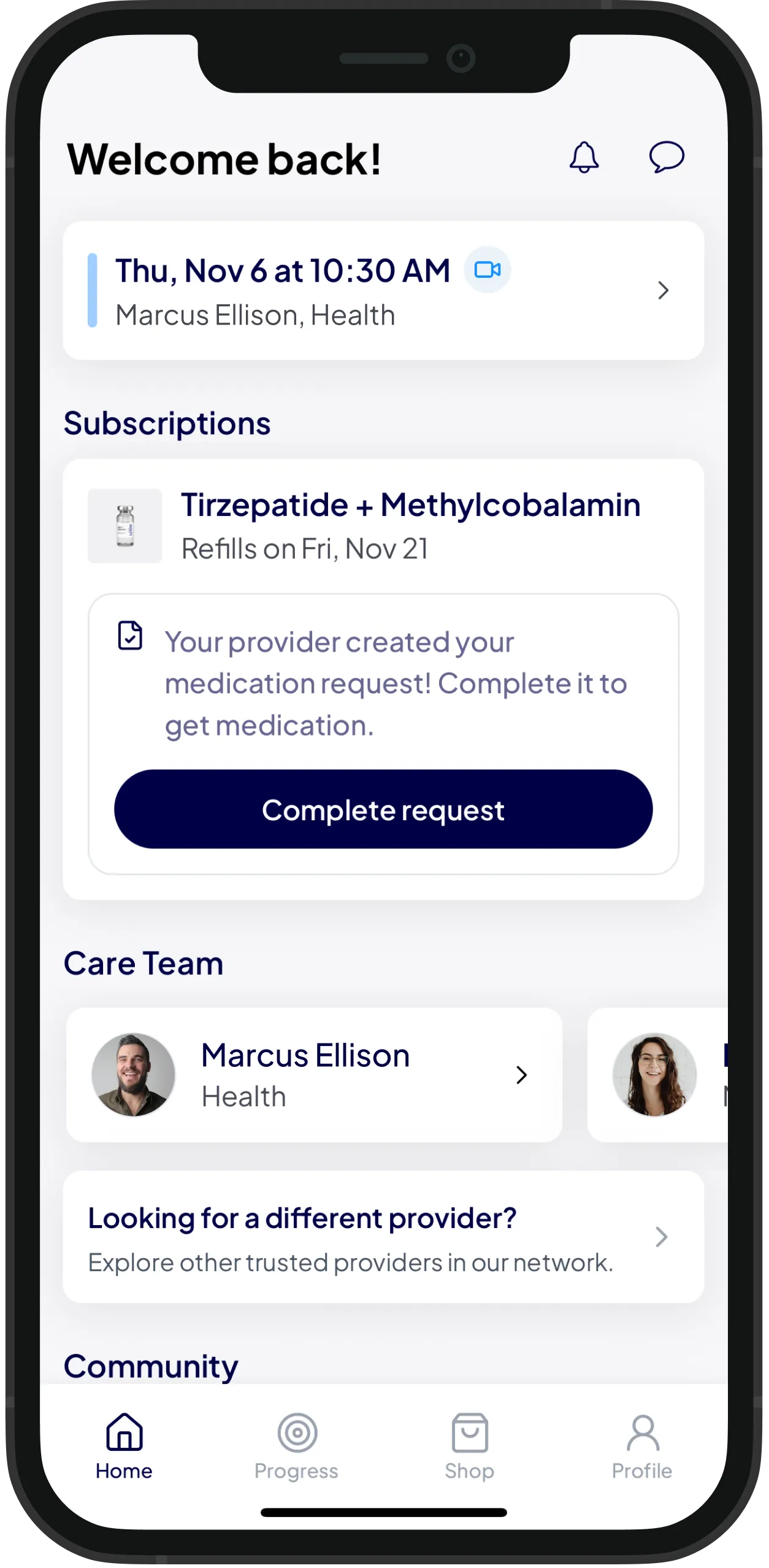Ready to transform your health?
Unlock access to expert guidance and a weight care plan crafted just for you.
Similar Articles
Similar Articles

GLP-1s for Pre-diabetes: Can You Prevent Type II Diabetes?
GLP-1s for Pre-diabetes: Can You Prevent Type II Diabetes?

Is Long-Term GLP-1 Use Safe? What 10-Year Data Suggests
Is Long-Term GLP-1 Use Safe? What 10-Year Data Suggests

GLP 1s and Cardiometabolic Health: How These Medications Support the Heart and Long Term Wellness
GLP 1s and Cardiometabolic Health: How These Medications Support the Heart and Long Term Wellness
Relationship Between GLP-1 Medications and Fertility
GLP-1 medications have been developed to treat type II diabetes & obesity. Visit this blog to know about the relationship Between GLP-1 Medications & Fertility

Table of Contents
Table of Contents
Overview of the medications and their effects
GLP-1 and the Reproductive System
The Research
Overview of the medications and their effects
GLP-1 and the Reproductive System
The Research
Overview of the medications and their effects
Glucagon-like peptide-1 (GLP-1) medications are a class of drugs that have been developed to treat type II diabetes and obesity – two conditions that are known to negatively impact fertility and lead to higher-risk pregnancies. These medications work by stimulating the release of insulin, the hormone that regulates your blood sugar, increasing the sensitivity of your cells to insulin, and regulating hunger. In addition to their effects on glucose metabolism, there is growing evidence to suggest that GLP-1 medications may also have an impact on fertility both directly, by acting on reproductive organs, and indirectly, through their ability to promote weight loss.
GLP-1 and the Reproductive System
One of the key mechanisms by which GLP-1 medications improve glucose metabolism is through their effect on the hormone insulin. Insulin plays a central role in regulating glucose levels in the body, and individuals with type II diabetes often have high levels of insulin resistance. In other words, their body is making insulin, but their cells are not responding appropriately to that insulin to help bring down their blood sugar and facilitate normal use of fuel. By stimulating the release of insulin and promoting improved insulin sensitivity, GLP-1 medications can help give an extra boost for lowering blood sugar levels and improving carbohydrate metabolism. Interestingly, GLP-1 also plays a role in the regulation of reproductive function.
The Research
A 2019 study published in Human Reproduction Update explained how GLP-1 may serve as a major link between metabolism and the reproductive system. This is thought to be due to GLP-1 stimulating the release of gonadotropin-releasing hormone (GnRH), which is a key molecule in our bodies that is essential for orchestrating normal reproductive function. High levels of sugar in the blood can inhibit the release of gonadotropin-releasing hormone (GnRH). Furthermore, GLP-1 may play an even larger role in reproduction, as GLP-1 receptors have been found on the ovaries, endometrium (lining of the uterus), and the testes, where it may have an anti-inflammatory and anti-fibrotic effect. All of these structures are at risk of injury in obesity, diabetes, and polycystic ovarian syndrome (PCOS).

Photo: Wikipedia.com
PCOS is a common cause of fertility problems in women, and is often associated with insulin resistance. A randomized controlled trial in Clinical Endocrinology randomized 176 overweight women between the ages of 18-40 years old with PCOS attempting to become pregnant to receive either the GLP-1 medication exenatide or metformin, a non-GLP-1 medication, for the first half of the study (12 weeks), followed by all women receiving metformin ONLY during the second half of the study (12 weeks).
They studied metabolic parameters after the first half and the rate of natural pregnancy in the second half for both groups. They found that women on exenatide had statistically significant decreased weight, total fat percentage, improved insulin resistance, and increased menstrual frequency when compared to the metformin group. Excitingly, the rate of natural pregnancy for the exenatide group was significantly higher, 43.6% of women versus 18.70% in the metformin group!
In men, GLP-1 medications may also have an impact on fertility. A study in Andrology revealed evidence suggesting that GLP-1 medications can improve sperm motility and metabolism. They also exerted positive effects on human Sertoli cells, which are the cells in the testicles that help produce sperm.
In addition to their effects on insulin and reproductive hormones, GLP-1 medications may also have an impact on fertility through their effects on body weight. Obesity is a common cause of fertility problems in both men and women, and weight loss can often improve fertility. GLP-1 medications have been shown to be effective at promoting weight loss in individuals with obesity.
Conclusions and When to See a Reproductive Specialist
It is important to note that while there is some evidence to suggest that GLP-1 medications may have beneficial effects on fertility, more research is needed to fully understand the mechanisms underlying these effects. Many studies have only been performed in a research lab or on mouse models. It is also important to recognize that these medications are not a replacement for proper fertility treatment and should not be used as such. The American College of Obstetricians and Gynecologists (ACOG) define infertility as the inability to get pregnant within 1 year of regular sexual intercourse in the absence of birth control for people under 35 years old.
In conclusion, GLP-1 medications may have a positive effect on fertility through their effects on insulin, reproductive hormones, and body weight through various mechanisms. Because maintaining a healthy body composition and recovery is vital when losing weight for reproductive health, following a structured approach to nutrition and movement can help ensure these metabolic improvements are sustainable. It is important to consult with your healthcare provider before starting treatment with GLP-1 medications, and to carefully follow the recommended dosing and treatment regimen.
Sources
Jensterle M, Janez A, Fliers E, DeVries JH, Vrtacnik-Bokal E, Siegelaar SE. The role of glucagon-like peptide-1 in reproduction: from physiology to therapeutic perspective. Hum Reprod Update. 2019;25(4):504-517. doi:10.1093/humupd/dmz019
Liu X, Zhang Y, Zheng SY, et al. Efficacy of exenatide on weight loss, metabolic parameters and pregnancy in overweight/obese polycystic ovary syndrome. Clin Endocrinol (Oxf). 2017;87(6):767-774. doi:10.1111/cen.13454
Cannarella R, Calogero AE, Condorelli RA, Greco EA, Aversa A, La Vignera S. Is there a role for glucagon-like peptide-1 receptor agonists in the treatment of male infertility?. Andrology. 2021;9(5):1499-1503. doi:10.1111/andr.13015
Overview of the medications and their effects
Glucagon-like peptide-1 (GLP-1) medications are a class of drugs that have been developed to treat type II diabetes and obesity – two conditions that are known to negatively impact fertility and lead to higher-risk pregnancies. These medications work by stimulating the release of insulin, the hormone that regulates your blood sugar, increasing the sensitivity of your cells to insulin, and regulating hunger. In addition to their effects on glucose metabolism, there is growing evidence to suggest that GLP-1 medications may also have an impact on fertility both directly, by acting on reproductive organs, and indirectly, through their ability to promote weight loss.
GLP-1 and the Reproductive System
One of the key mechanisms by which GLP-1 medications improve glucose metabolism is through their effect on the hormone insulin. Insulin plays a central role in regulating glucose levels in the body, and individuals with type II diabetes often have high levels of insulin resistance. In other words, their body is making insulin, but their cells are not responding appropriately to that insulin to help bring down their blood sugar and facilitate normal use of fuel. By stimulating the release of insulin and promoting improved insulin sensitivity, GLP-1 medications can help give an extra boost for lowering blood sugar levels and improving carbohydrate metabolism. Interestingly, GLP-1 also plays a role in the regulation of reproductive function.
The Research
A 2019 study published in Human Reproduction Update explained how GLP-1 may serve as a major link between metabolism and the reproductive system. This is thought to be due to GLP-1 stimulating the release of gonadotropin-releasing hormone (GnRH), which is a key molecule in our bodies that is essential for orchestrating normal reproductive function. High levels of sugar in the blood can inhibit the release of gonadotropin-releasing hormone (GnRH). Furthermore, GLP-1 may play an even larger role in reproduction, as GLP-1 receptors have been found on the ovaries, endometrium (lining of the uterus), and the testes, where it may have an anti-inflammatory and anti-fibrotic effect. All of these structures are at risk of injury in obesity, diabetes, and polycystic ovarian syndrome (PCOS).

Photo: Wikipedia.com
PCOS is a common cause of fertility problems in women, and is often associated with insulin resistance. A randomized controlled trial in Clinical Endocrinology randomized 176 overweight women between the ages of 18-40 years old with PCOS attempting to become pregnant to receive either the GLP-1 medication exenatide or metformin, a non-GLP-1 medication, for the first half of the study (12 weeks), followed by all women receiving metformin ONLY during the second half of the study (12 weeks).
They studied metabolic parameters after the first half and the rate of natural pregnancy in the second half for both groups. They found that women on exenatide had statistically significant decreased weight, total fat percentage, improved insulin resistance, and increased menstrual frequency when compared to the metformin group. Excitingly, the rate of natural pregnancy for the exenatide group was significantly higher, 43.6% of women versus 18.70% in the metformin group!
In men, GLP-1 medications may also have an impact on fertility. A study in Andrology revealed evidence suggesting that GLP-1 medications can improve sperm motility and metabolism. They also exerted positive effects on human Sertoli cells, which are the cells in the testicles that help produce sperm.
In addition to their effects on insulin and reproductive hormones, GLP-1 medications may also have an impact on fertility through their effects on body weight. Obesity is a common cause of fertility problems in both men and women, and weight loss can often improve fertility. GLP-1 medications have been shown to be effective at promoting weight loss in individuals with obesity.
Conclusions and When to See a Reproductive Specialist
It is important to note that while there is some evidence to suggest that GLP-1 medications may have beneficial effects on fertility, more research is needed to fully understand the mechanisms underlying these effects. Many studies have only been performed in a research lab or on mouse models. It is also important to recognize that these medications are not a replacement for proper fertility treatment and should not be used as such. The American College of Obstetricians and Gynecologists (ACOG) define infertility as the inability to get pregnant within 1 year of regular sexual intercourse in the absence of birth control for people under 35 years old.
In conclusion, GLP-1 medications may have a positive effect on fertility through their effects on insulin, reproductive hormones, and body weight through various mechanisms. Because maintaining a healthy body composition and recovery is vital when losing weight for reproductive health, following a structured approach to nutrition and movement can help ensure these metabolic improvements are sustainable. It is important to consult with your healthcare provider before starting treatment with GLP-1 medications, and to carefully follow the recommended dosing and treatment regimen.
Sources
Jensterle M, Janez A, Fliers E, DeVries JH, Vrtacnik-Bokal E, Siegelaar SE. The role of glucagon-like peptide-1 in reproduction: from physiology to therapeutic perspective. Hum Reprod Update. 2019;25(4):504-517. doi:10.1093/humupd/dmz019
Liu X, Zhang Y, Zheng SY, et al. Efficacy of exenatide on weight loss, metabolic parameters and pregnancy in overweight/obese polycystic ovary syndrome. Clin Endocrinol (Oxf). 2017;87(6):767-774. doi:10.1111/cen.13454
Cannarella R, Calogero AE, Condorelli RA, Greco EA, Aversa A, La Vignera S. Is there a role for glucagon-like peptide-1 receptor agonists in the treatment of male infertility?. Andrology. 2021;9(5):1499-1503. doi:10.1111/andr.13015
Read next
Ready to transform your health?
Unlock access to expert guidance and a weight care plan crafted just for you.

Ready to transform your health?
Unlock access to expert guidance and a weight care plan crafted just for you.

Ready to transform your health?
Unlock access to expert guidance and a weight care plan crafted just for you.


© 2026 Mochi Health
All professional medical services are provided by licensed physicians and clinicians affiliated with independently owned and operated professional practices. Mochi Health Corp. provides administrative and technology services to affiliated medical practices it supports, and does not provide any professional medical services itself.


© 2026 Mochi Health
All professional medical services are provided by licensed physicians and clinicians affiliated with independently owned and operated professional practices. Mochi Health Corp. provides administrative and technology services to affiliated medical practices it supports, and does not provide any professional medical services itself.


© 2026 Mochi Health
All professional medical services are provided by licensed physicians and clinicians affiliated with independently owned and operated professional practices. Mochi Health Corp. provides administrative and technology services to affiliated medical practices it supports, and does not provide any professional medical services itself.
















